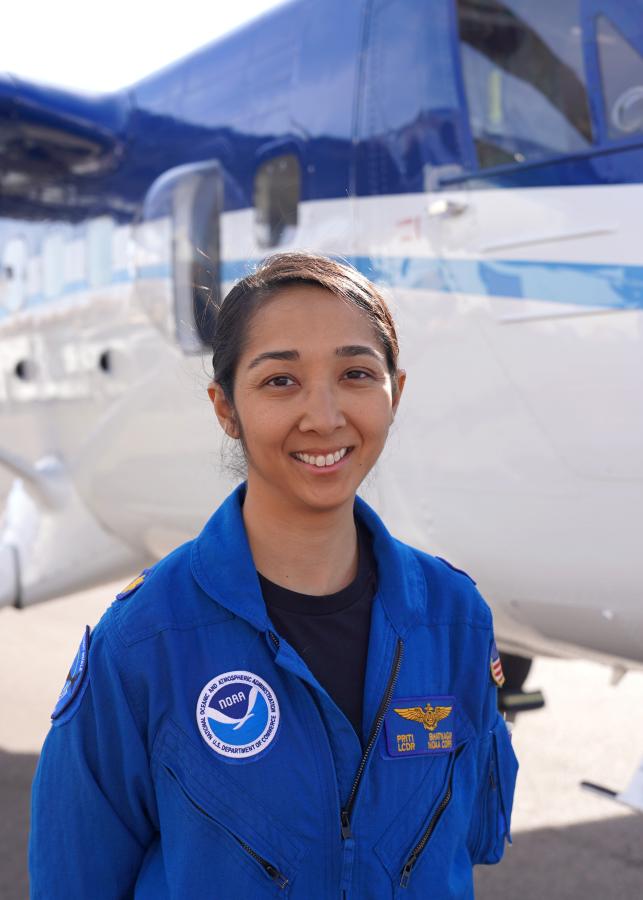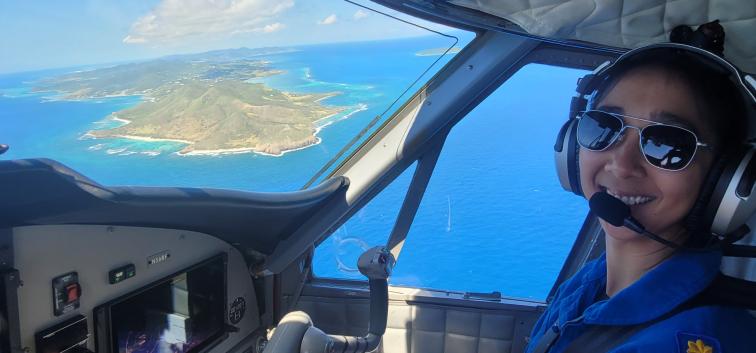
The NOAA Commissioned Officer Corps (NOAA Corps) is one of the nation’s eight uniformed services and NOAA Corps officers are an integral part of NOAA. With approximately 340 officers and growing, the NOAA Corps supports nearly all of NOAA’s programs and missions. The combination of commissioned service and scientific expertise makes these officers uniquely capable of leading some of NOAA’s most important initiatives. Meet NOAA Corps officer Lt. Cmdr. Priti Bhatnagar.
Where did you grow up?
I grew up in Exton, Pennsylvania, about 45 minutes west of Philadelphia.
Where did you go to school and in what subject did you get your degree(s)?
I went to Daniel Webster College in Nashua, New Hampshire and earned a Bachelor of Science degree in Aviation Flight Operations and another in Aeronautical Engineering. I attended graduate school at University of Illinois Urbana-Champaign where I earned a Master of Science in Aerospace Engineering.
What inspired you to become a NOAA Corps officer?
I had actually looked at NOAA right after high school, along with the service academies. I knew I wanted to fly, but decided I didn't want to join a uniformed service right away. I also learned that at the time there wasn't a direct path to aviation I qualified for at the NOAA Corps, and would have first worked on a research ship. I went to college and graduate school as a civilian, and joined the U.S. Navy after graduate school. I wanted a flying career that was interesting and dynamic, served a larger purpose and ultimately hoped to combine my interest in engineering and aviation as a test pilot. I spent 11 years in the Navy, with the last four years spent as a test pilot at Naval Air Station Patuxent River, which affirmed my passion for flying but also science, research and engineering.
Although I thoroughly enjoyed all my time in the Navy, I decided to move on and started looking at potential flying jobs. I re-discovered the NOAA Corps and the option to complete an inter-service transfer. Before I knew I wanted to fly, I was interested in pursuing a career in biology or conservation, so the NOAA missions were an appealing way to combine my desire to stay in aviation, serve a greater purpose, and incorporate my interests in science, engineering, and environmental stewardship.
What do you do as a NOAA Corps officer?

I currently fly NOAA’s Twin Otter and Gulfstream-IV, and my ground job is the Operations Department Aircraft Acquisitions project manager, working to help incorporate a new G-550 into the fleet as we sundown our Gulfstream-IV aircraft. As a NOAA pilot you fly aircraft outfitted with scientific research equipment specially tailored for our dynamic missions that support hurricane research, reconnaissance and emergency response, marine mammal surveys and assessments, coastal mapping missions and several other interesting science and research missions.
What was one of your favorite missions or experiences?
It's hard to pick a favorite because they are all different, but one of my favorites so far is flying the marine mammal surveys, particularly North Atlantic right whale surveys in the Twin Otter. The North Atlantic right whale is an endangered species with fewer than 350 individuals remaining. I'm lucky to play a small part in a much larger effort to conserve, protect and learn about their species. Playing a role in the hurricane research and reconnaissance missions is also very fulfilling, in that our flight data feeds hurricane forecasts in near real time.
What advice would you give to someone who wants to be a NOAA Corps Officer?
If you haven't already earned a bachelor's degree, consider earning one in a STEM (science, technology, engineering and math) field. Don't be afraid to reach out to a NOAA Corps recruiter if you have questions about what we do as officers on either the aviation or marine side - that's the best way to learn if it's something you will be interested in. They can put you in touch with someone who will be happy to talk to you about what we do on a day to day basis.
What do you like to do outside of work?
I enjoy spending time with my dogs, gardening and hiking. I somehow always seem to have too many home DIY projects going on.
What is your favorite aircraft and why?
The one that I'm flying! It’s hard to choose. Every platform I've flown over my 20 years of flying has taught me something that's made me a better pilot, so I can't pick just one!

